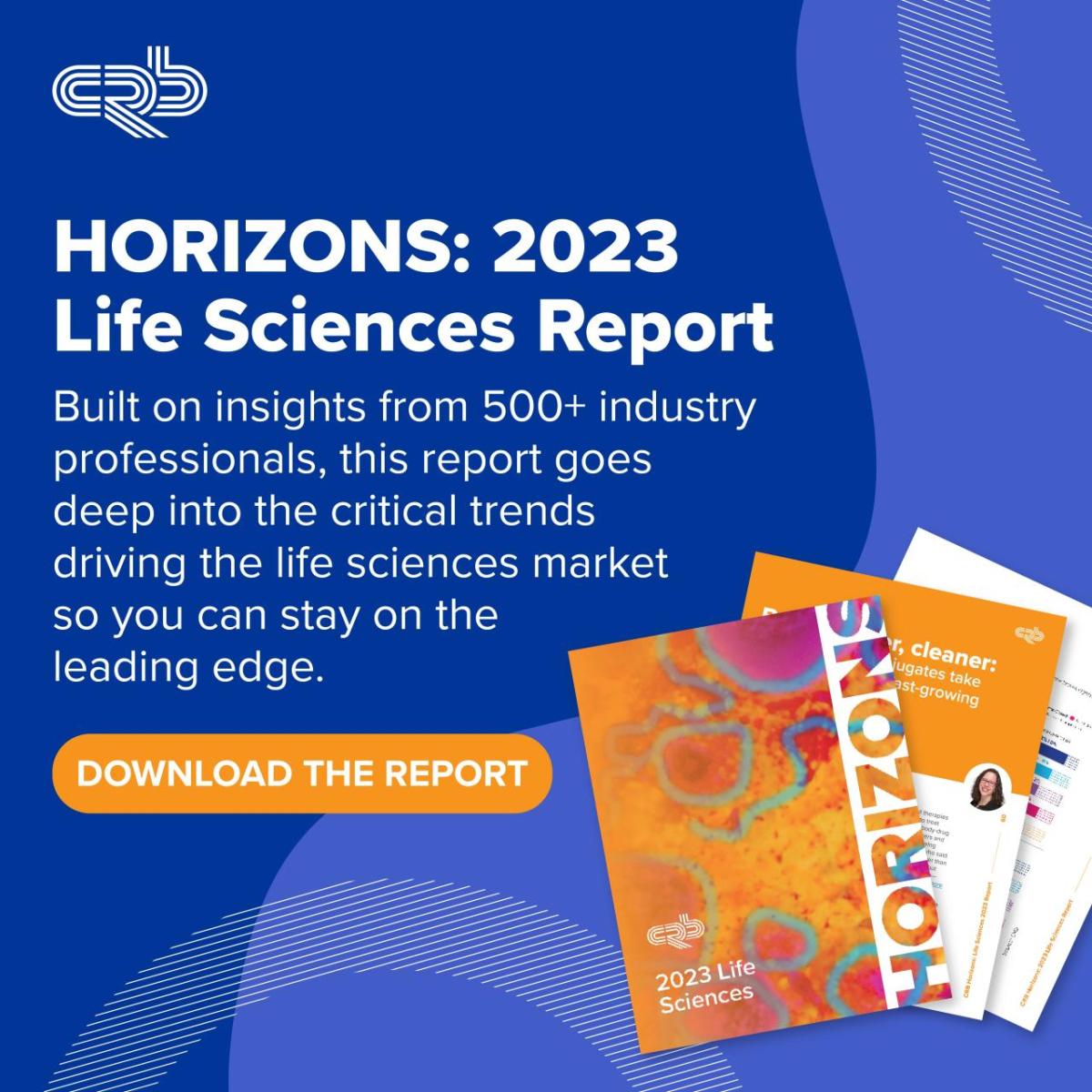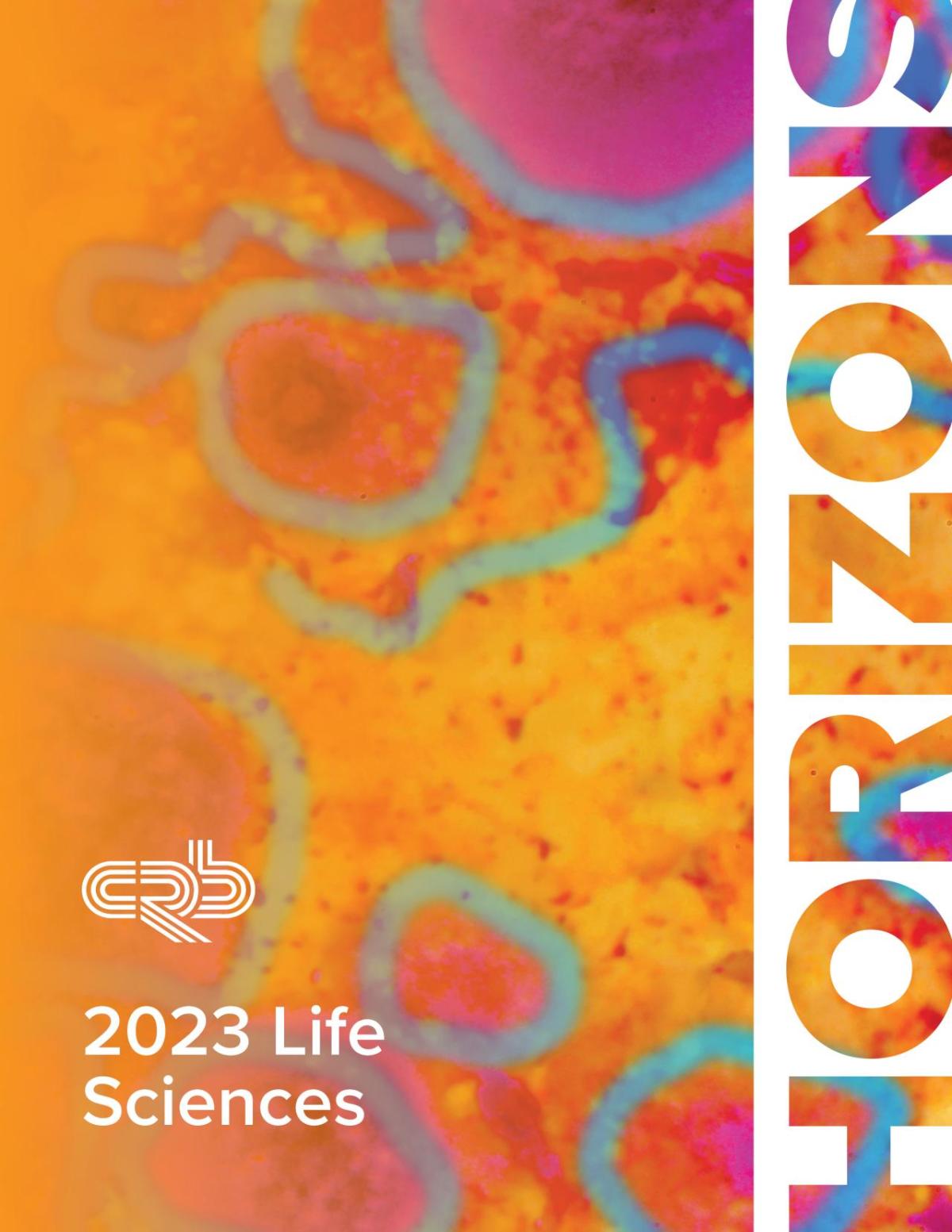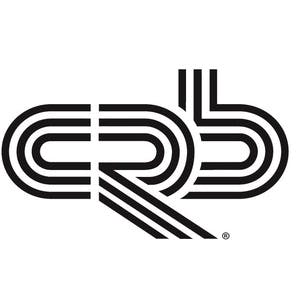Digitalization, AI and Automation Lead Pack of Advances Fueling Life Sciences Industry Growth, New CRB Report Finds
Survey-driven Horizons report explores data’s rising role in speeding therapies to patients, while surprising shifts in mRNA, cell and gene therapy, and antibody drug conjugates reflect industry’s transformation
KANSAS CITY, Mo., September 26, 2023 /3BL/ - Across the vast global life sciences supply chain, data, digitalization, automation, and artificial intelligence are telling complex and compelling stories about how we move vital vaccines, therapies and cures to patients. Are we ready to listen?
The answer, found in CRB’s newest survey-based Horizons: Life Sciences report, is an emphatic “yes” as the industry embraces data analytics, automation and AI technologies to streamline how groundbreaking products scale quickly and efficiently from R&D to commercial production. The report, released today as a free download, also explores shifts within mRNA technologies, cell and gene therapies and antibody drug conjugates as manufacturers place increased focus on increasing patient access to groundbreaking therapies.
Underpinning the industry’s transformation, the report finds, is its progress along the digital plant maturity model, with companies of all sizes adopting an agility mindset. Digitalization investments, the survey data finds, are driving advances in drug discovery, quality control and regulatory compliance.
CRB’s Horizons report is fueled by the survey responses of more than 500 industry leaders representing North American, European, and multinational companies. In his executive summary exploring the industry’s renewed focus on patient access, CRB Vice President of Life Sciences Noel Maestre offers a pointed prescription: “The distance between an emerging therapy with regulatory approval and mainstream access for the patients who need it remains wide in many cases. For that to change,” he writes, “funding systems designed to support ongoing treatment need to prepare for a future of one-time curative therapies. The science behind these new advanced modalities is way too promising and can only be held back for so long by financial hurdles until the floodgates finally break wide open.”
The report also features a Q-A session with Max Moore, Vice President of Manufacturing and Operations at Ionis Pharmaceuticals, who describes how the company’s patient-centered focus drives his teams and the firm’s growth: “By inviting patients to the table (figuratively and literally), that’s what we do: we generate stronger engagement from our employees, who see meaning in their work and feel loyal to our mission in a way that no benefits package or salary bracket could foster on its own.”
Of the Horizons report’s 506 respondents, 93 percent report their companies are implementing strategies to collect, analyze and act on data. More than three quarters of respondents said plans were in place to use AI tools within the next two years to help speed their products to market – a level of investment that brightly underlines the big bet C-suite leaders are placing on digital transformation. Many companies are using AI, for instance, to design molecules, which reduces safety risks and regulatory complexity.
“Adopting a mindset of manufacturing in the early stages can lead to significantly faster technology transfers and reduced time for regulatory filings,” Niranjan Kulkarni, CRB’s Senior Director of Consulting Services, and Ryan Thompson, Senior Specialist for Industry 4.0, write in the report. “Further, with the flexibility and scalability of cloud and software-as-a-service offerings it’s often cheaper to take this approach versus developing complicated, paper-based data collection programs and incurring the associated technical debt.”
The report also provides deep, prescriptive analysis on additional critical industry trendlines, including:
Coding RNA technologies: While nearly all surveyed mRNA experts pointed to the potential of mRNA for therapeutic vaccines, vaccine developers continue to embrace coding RNA to prevent infectious diseases. David Estape, a CRB Senior Fellow, Biopharmaceutical Process, joins Steve Attig, Fellow, Bioprocess Design, in reporting that despite universally high expectations for the development and production of therapeutic vaccines, significant differences exist between U.S. and European producers in their approaches.
Cell therapies: More than three-quarters of respondents reported having a cell therapy product in their pipeline, stamping this submarket – once the focus of boutique researchers – as a clear industry mainstay. Breakthroughs are happening rapidly, and the report’s authors explore the role that gene editing plays in getting more therapies to the patients who need them, more quickly.
Gene therapies: Survey data reveals a curious split affecting gene therapy’s place in the broader life sciences industry. As Peter Walters, CRB’s Fellow, Advanced Therapies, writes, some companies are pulling back, some are investing in stable producer cell lines to bring viral-based products to market, while a third group “has its sights set on emerging non-viral manufacturing methods to move them from the research bench to the bedside.” With more than 20 years in pharmaceutical process and facility design, Walters offers an insider’s perspective on the effect these paths have on manufacturers, contractors and, ultimately, patients.
Antibody-drug conjugates: The exciting ascendancy of antibody-drug conjugates is tempered by the difficulties of manufacturing these highly toxic drugs. CRB chemical engineering expert Ashley Harp analyzes what ADC developers and manufacturers are doing to navigate those challenges, shining a light on how new purification technologies—like continuous chromatography—promise to reduce solvent use while accelerating production.
Drug product manufacturing: Luke Stockhausen, a CRB process engineer with deep experience in parenteral and biopharmaceutical manufacturing, explores the impact of the recent EudraLex Annex 1 deadline on European and U.S. producers, and finds divergent geographic approaches to comply with the new regulations – including a broad reluctance by the European cohort to push forward with new technologies before they understand how Annex 1 plays out.
About CRB
CRB is a leading provider of sustainable engineering, architecture, construction, and consulting solutions to the food and beverage and life sciences industries. Led by its innovative ONEsolution™ service, CRB provides successful integrated project delivery for clients demanding high-quality solutions, on time and within budget. The company's more than 1,500 employees provide world-class solutions that drive success and positive change for clients, people, and communities. CRB is a privately held company with a rich history of serving clients throughout the world, consistently striving for the highest standard of technical knowledge, creativity, and execution.
Media Contacts:
Chris Clark
Director of Communications, CRB
816-674-0572
Bonnie Quintanilla
Clarity Quest
877-887-7611



